Arcanum: Of Steamworks and Magick Obscura
Steam technology and magic combine to form a volatile mix in the RPG from Fallout creator, Tim Cain. An open-ended structure and a skill-based character system are among the game's many features.
In early May, Sierra invited the gaming press to the Magic Castle in Hollywood to take an early look at Arcanum. Prepped in formal dress and surrounded by the trappings of an old private restaurant and magic club, we knew that the ambiance was clearly intended to set a unique mood, to take us outside the realm of ordinary expectations. It was an appropriate setting. For Arcanum will be strongly set apart from the pack for the simple reason that it takes an uncommon tack in the RPG world, focusing on open-ended reactive storytelling and grafting turn-of-the-century technology onto a standard fantasy setting.

Arcanum's developer certainly isn't a stranger to innovative RPG concepts. In April 1998 Tim Cain, Leonard Boyarsky, and Jason Anderson of the Fallout development team left Interplay to start their own design house, Troika Games. 1997's Fallout was a huge success because of its unconventional role-playing: the ability to stray outside the main story arc, to do evil and unanticipated things, and generally, to play in a very new interactive environment. There have been relatively few computer role-playing games to give you the opportunity to play in a nonfantasy world. In pen-and-paper role-playing games there are many futuristic, real-world, and alternate universe settings to choose from. But outside the postapocalyptic classic wasteland, there have been few nonfantasy RPGs for the PC. In Arcanum we have a look that's a mixture of moody 19th-century Victorian with Tolkienesque fantasy, which has been dubbed "steampunk."
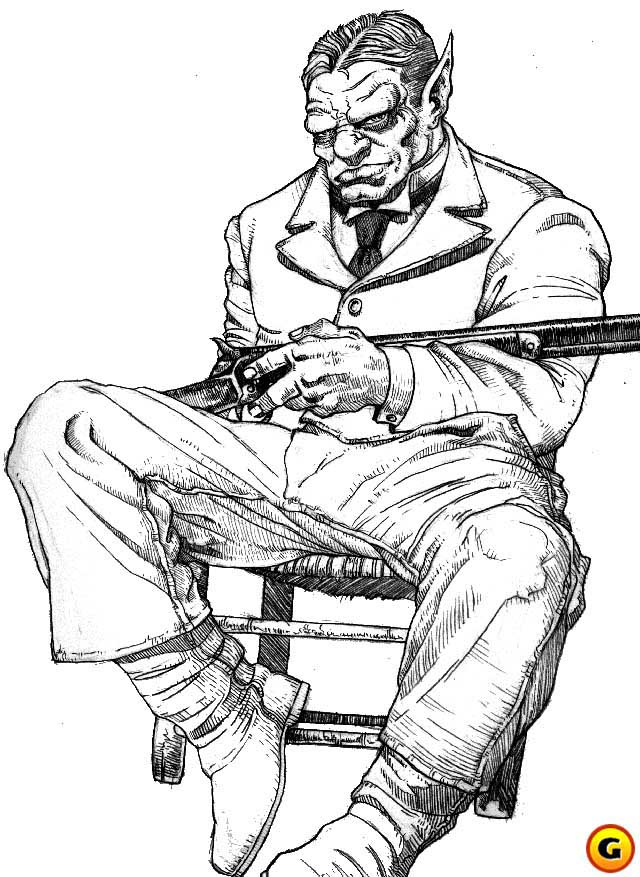
The game begins as the zeppelin you were taking to a vacation destination crashes to the ground. A follower of a local sect eyes you carefully and takes you as his promised messiah, who it is written will appear in a fiery descent. So starts a story rife with conflicts within a society traditionally dominated by magic that has suddenly been brought into an industrial revolution, with all the awe-inspiring technology that entails.
Character creation
There are a number of non-AD&D RPGs that emphasize specific skill development over merely leveling up with a given character class to get set bonuses. Arcanum takes this skill model and greatly multiplies the richness of the system, both giving you a huge range of freedom and forcing you to make tough choices from the variety of career options.
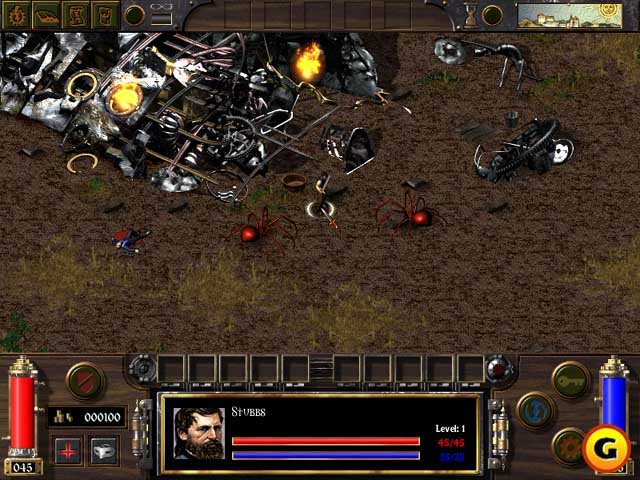
When creating your character you must first choose from eight races - human, dwarf, elf, half-elf, gnome, halfling, half-orc, half-ogre - that each have certain bonuses and penalties to stats. Then you distribute attribute points among eight stats - four mental (intelligence, willpower, perception, and charisma) and four physical (strength, dexterity, constitution, and beauty) - and select background characteristics that fill out your character's back story and lend special attributes. The race you select also affects other attributes of your character, so elves lean more to the magical and tend to be well-liked by Arcanum's denizens, while the dwarves' highly regarded smithing makes them more inclined toward technology.
A classless character system means, for example, that there are no formal restrictions for weapons or armor beyond strength and other basic attribute minimums. In Arcanum, you'll probably be able to equip a given item, but that doesn't make it your best choice.
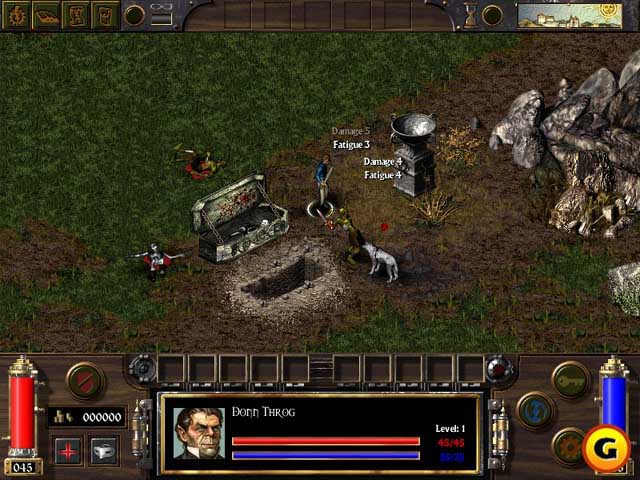
The choices don't end there. You'll learn basic combat, thieving, social, and technology skills. The combat skills include bow, dodge, melee, and throwing abilities. In Arcanum, any generalist can learn the thieving, which is divided into the four skills of concealment, pickpocket, silent move, and spot trap. Most players will find that character interaction plays a large part in the game and that the social skills (gambling, haggle, heal, and persuasion) make it a lot easier to get your way. For those with some technological inclination, it'll be essential to master repair, firearms, picking locks, and arming traps. Notice that the firearms skill isn't grouped with the other combat skills. This is because general combat abilities with swords and bows, common fantasy weapons, aren't affected by whether your character leans toward magic or technology, while a gun is no doubt more of a hazard than a help in the hands of a mage.
Of guns and spiders
One of the most interesting elements of Arcanum is that the conflict between magic and technology is not only a centerpiece for the story but is integrated right into the way your character develops. Even the name Arcanum (a derivation related to "arcane" and the Latin word for "secret") conveys the sense that both the "steamworks" and "magic" of the subtitle are, for the uninitiated, equally arcane. The complexity of both the magical and the technological fields makes it impossible to master even a large part of either.
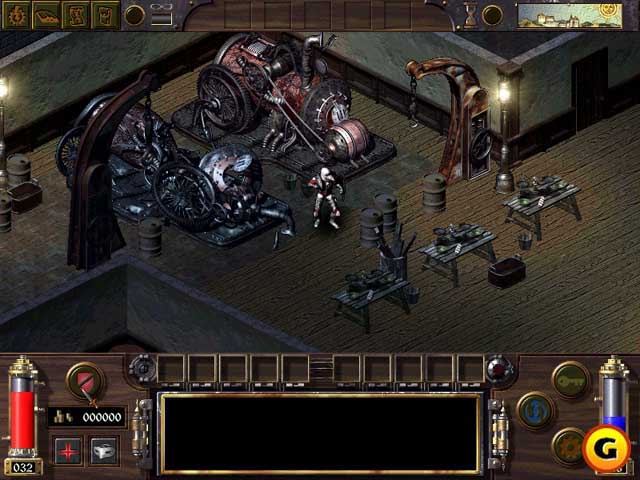
Arcanum's technology system is very different from anything we've seen before. Knowledge of a specific technology essentially gives you the ability to manufacture a related item from a schematic diagram once you find the necessary components. There are eight disciplines of technology you can study: anatomical, chemistry, electrical, explosives, gun smithy, mechanical, forged weaponry, and therapeutics. A discipline has seven degrees that each unlock a single item's schematic. Running from novice to master and finally to professor, these degrees provide knowledge of increasingly complex technology and require minimum attributes.
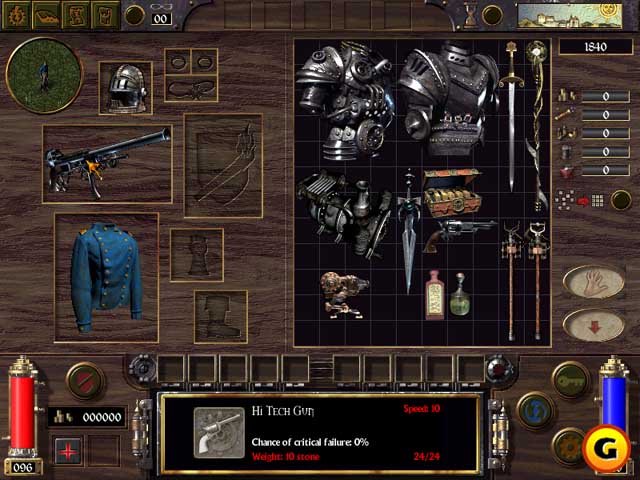
The technologies demonstrated were of obvious practicality, running from simple weapons like a fine pistol or the powerful elephant gun to basic healing therapeutics or an impressive mechanical spider that will autonomously assist you in combat, like a pet in EverQuest. Troika hasn't limited itself to real technology. There were many items in the 19th-century world that were supposed to give the owner a special effect because of the item's magnetic, electrical, or other "technological" properties. So in Arcanum, a "charged ring," for example, will increase your character's dexterity because of its electrical properties.
Magic and blessings
If the game's technological component surprises with its uniqueness and the impressive power of its items, then the magic system will awe you in its diversity. Arcanum has 80 spells split into groups of five for a total of 16 colleges, which include the Morph College (change substances), the Black Necromantic College (negatively affect a target's life force), the College of Phantasm (summon illusions), and the Temporal College (control time). The design team figures most magical characters will completely learn at most about five or six colleges. Let's look at the College of Nature for an example of how spells increase in power within a college:
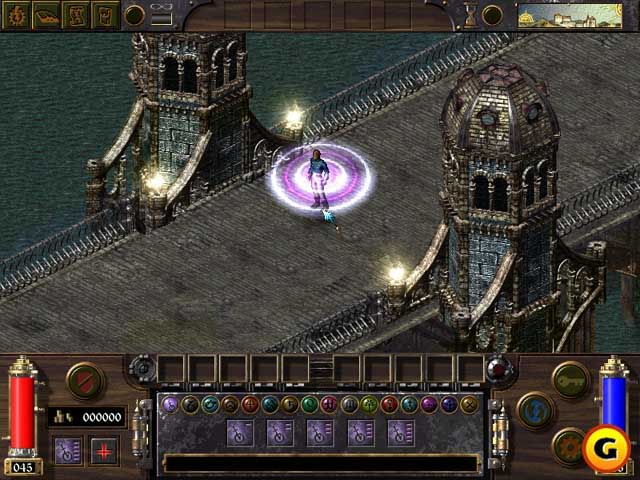
Entangle imbues a patch of vegetation with motion, and the target creature is slowed down.
Charm Beasts causes every animal in the vicinity to gain a Good reaction to the player.
Control Beast places the mind of the animal under the control of the caster, unless a saving throw is made.
Regenerate greatly increases the caster's heal rate.
Succour Beast summons an animal, which will appear in the target tile and immediately attack the caster's enemies.
Instead of powering spellcasting with mana, Arcanum ties a mage's abilities to his fatigue level, which also determines some physical activities. Not only does this tie magic more strongly to a concrete attribute (constitution), but it also means spellcasters will have to carefully consider their options before using up those last fatigue points - at the moment of complete exhaustion, running will not be an option.
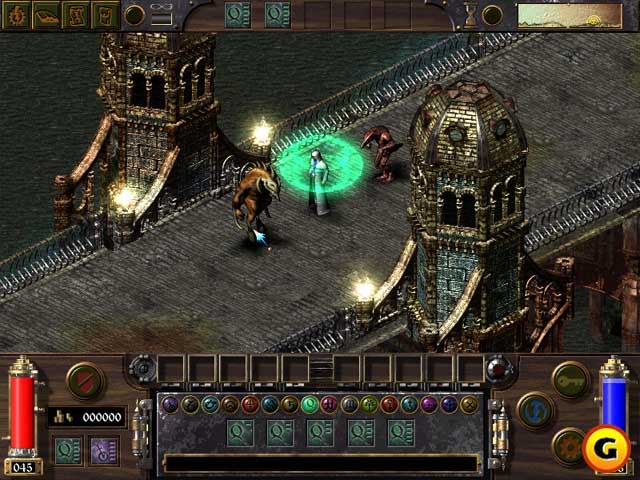
There are, however, magical talismans, staves, and other items that contain mana. If you are in possession of one of these artifacts, your magic will draw upon the item's mana before draining your fatigue. The item will then recharge through lack of use, in the same way that you do. There are also items that contain innate spells, some of which aren't among the 80 you yourself can learn.
Interestingly, Troika has added something of a karmic third virtue that passes outside the bounds of magic and technology. If you commit particularly enlightened or dastardly acts as you adventure, then you may fall under the influence of either a blessing or a curse that affects your attributes until it is lifted or dispelled by another story or quest-driven event. Choose to assist or assault that old lone woman at those empty crossroads and you'll feel the consequences of the game's open-ended design. Another incentive to get involved in the game's storyline is found in fate points, with which you can earn quests and use for special power-ups, in similar fashion to Fallout's action points.
A fully reactive world
The main story will send you into the middle of a controversy and challenge you to set the world right, but the characters and side quests you'll find along the way are really so much more than window dressing for the combat engine. The Arcanum world is designed to be highly reactive. As you'll immediately notice from the reaction bar at the bottom of the interface, nonplayer characters act differently toward you depending on your race, skills, beauty, and charisma scores.
The game is designed with multiple story resolutions and numerous side quests, so it is independent of your class or race. In this sense, Arcanum builds on Fallout, where it was quite possible to succeed even by playing as an evil character and contrary to the game's stated objective. Numerous side quests can offer unique schematics and skill masteries and will also keep you busy if you get stuck somewhere in the main story arc. But be careful: Completing some quests will logically close off others. To get the dodge mastery from the dodge master, you must help him resolve a standing grudge by killing the melee master, but if you do so, that means you won't be able to learn melee mastery.
Arcanum integrates a few technical features that really impact gameplay. Since nighttime always adds an extra gothic feel, and stealth will definitely be the preferred mode for some players, there's a full day/night cycle supported by a 16-bit-color, dynamic lighting engine. Light greatly affects not only your ability to see the surrounding area but also your character's performance in combat. Also, so that the game can fully support and sync multiplayer action, the game functions in real-time as well as in segmented turns.
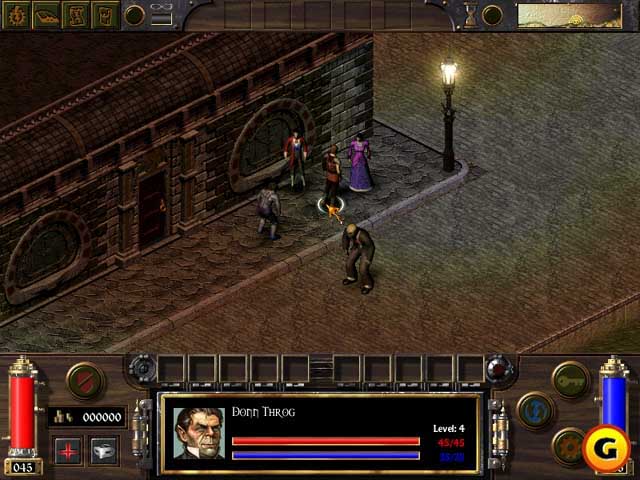
The possibility for all kinds of trickery is built right into the game. In Arcanum, windows can make for a quick exit. The engine lets you step through a ground-floor window. And since window locks tend not to be as robust as a bolted door, a stealthy character may want to force open a window. Another trick a thief-type character might employ is to shoot out the streetlights in an area he wishes to pass through. The light itself has a set number of hit points, separate from the light post, so a well-placed arrow will turn out the lights. And don't think those lights will be out the next time you come wandering back into town. The lights will respawn, since surely some upstanding citizen will have fixed them.
A tight concept, a flexible story, and diverse gameplay options could make Arcanum one of this year's most innovative RPGs. Not only does it look like it can be played as a straight action-RPG, but it also emphasizes the diplomacy and branching character interaction that so resemble a robust adventure game. The development team has a major success to back it up, so we're hopeful that it will smoothly execute its grand designs for this game.
Got a news tip or want to contact us directly? Email news@gamespot.com
Join the conversation